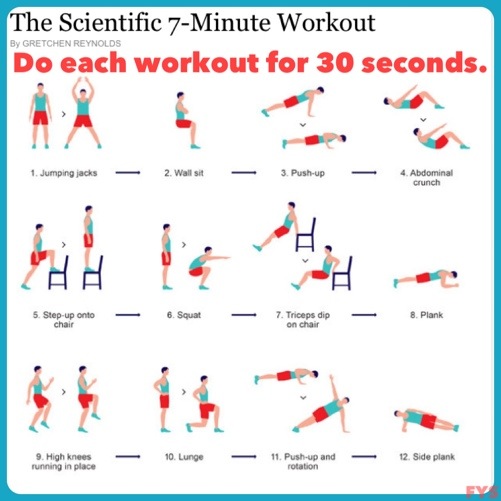|
Do you have 7 minutes a day? Then, yes, you do have time to exercise. Latest research says that yes, just seven minutes of exercise can do a body good. But what exactly can you hope to accomplish in just seven minutes? That’s less time than it takes most of us to shower, or brew coffee. According to this research article published last May, a specific format of exercise can decrease body fat, improve insulin sensitivity (very important for pre-diabetics and diabetics), improve your body’s oxygenation (that’s good) and increase muscular fitness. So what is this specific type of exercise that can do all this in just seven minutes? High Intensity Circuit Training, that’s what. Using only the resistance from your body weight, a wall, a floor and a chair, you can experience a full-body workout within a coffee break. And reap the benefits, too. Here’s an overview of the exact exercise tested in research. Each activity is performed for 30 seconds as fast/hard and safely possible, with 10 seconds rest between. And that comes out to a total of 7 minutes of exercise. Although their research has been shown that seven minutes definitely has positive benefits, if you are looking to seriously lose weight, build muscle, and reverse high blood sugars, the authors advise performing this circuit training 3 times in a row per day for a total of 21 minutes. If you’re looking to reverse obesity and prevent chronic disease, I think you’ll be able to find 21 minutes to spare in your day.
If you are new to exercise, or new to these type of activities, you may want a fitness trainer or some other type of professional to help instruct you in safe and proper form. The last thing you want is to get injured while trying to do something healthy for yourself. Have you tried this before? Do you regularly do some form of high-intensity or circuit training? Let me know your experience. And of course, leave any questions below! To your good health and fitness, Dr. Angela Resources: Follow along to an instructional YouTube video Stay on track with the free online 7 Minute Scientific Workout Timer Further reading/reviews: Wellness/NY Times review Huffington Post
1 Comment
If you’re an athlete, outdoors enthusiast or clumsy and prone to injuries, you’ve probably heard of RICE. It’s something that most of your doctors know, and what they have commonly told you to do: Rest, Ice, Compression, Elevation. Sprained ankle? RICE it. Torn rotator cuff? RICE it. What to do with your rice cooker? Rice it. Ok, joking on the last one. But in all seriousness, there is now a big revolution in the way we think about injury, inflammation, and what should we really do? Introducing MEAT: Movement, Exercise, Analgesia (pain relief), Treatment (alternating hot and cold, acupuncture, etc.). What’s the big change? Well if you look at the details of those acronyms, they’re almost opposite.
What was Rest is now Movement. What was Compression and Elevation (so sitting laid up somewhere) is now Exercise. These are some common recommendations that those of us in the alternative medicine field have known of and have been using for a long time. But now it is nice to know that my hesitance to fall in line with RICE recommendations is now more scientifically proven and that MEAT really is the way to go (sorry vegetarians, I didn’t make it up). And the last important details (or disclaimers, whatever you want to call it): -A sprained ankle may not just be a sprained ankle! There could be ligament or tendon tears, or a break in one of the many small ankle bones, so get it checked out by a healthcare professional. -Don’t push yourself to recover so quickly that you end up hurting yourself further. Yes, movement is beneficial after an injury, but that means some gentle walking or yoga-like activity, not a half-marathon the day after. I do offer a lot of support and treatments for acute injuries in my office, and also work closely with acupuncturists, massage therapists and chiropractors, so if you have any questions about this, please let me know! Hoping you recovery swiftly and fully, Dr. Angela Further reading on the research and clinical findings of MEAT- check out this website. |
Archives
June 2024
Categories
All
|
about the doc |
patient infocontact |
|
Privacy Policy
© Copyright 2011-2024, Dr. Angela Cortal ND LLC website content is for educational purposes only and is no substitute for medical advice (see the Terms of Use Agreement for this site), you must establish a doctor-patient relationship to receive that! |

